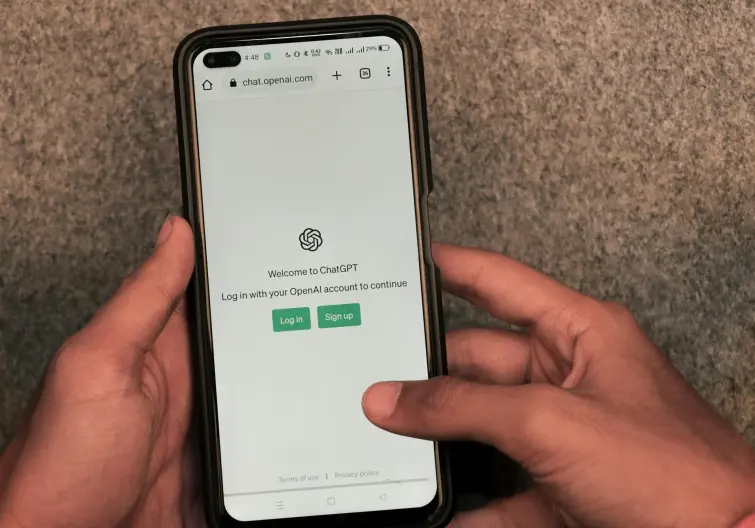The famous adage, "There's no such thing as a free lunch," feels especially relevant in the era of AI technologies like ChatGPT. This brings us to question the true cost of the assistance provided by such platforms, particularly in terms of our privacy.
What does using ChatGPT mean for your data, and how can you protect yourself? We explore these important questions, and more, in the following article.
In what's rapidly becoming the era of artificial intelligence (AI), services like ChatGPT seem to be at the forefront of innovation. They offer an unprecedented level of processing power and interactive data sharing, all in a perfectly understandable human language.
While these advancements have undoubtedly revolutionized the convenience and efficiency with which we approach AI, they have also generated new privacy risks and concerns that we shouldn't take for granted. This article explores the latter and shows some clever ways you can navigate ChatGPT to protect your privacy rights and data integrity.

Overall data security and privacy
The primary concern with ChatGPT revolves around overall data security and privacy. Given its non-stop interaction with users, plus frequent training on extensive datasets that often include personal information, ChatGPT is a real sensitive data time bomb. That's why its mechanisms for handling, storing, and protecting user data are of paramount importance. The good news – they go through constant updates and improvements.
The bad news – the risk of unauthorized access and data breaches is still significant, all the more because each breach threatens to expose users' private data and interactions. On top of that, there's the added risk of data misuse and (unintentional) infringement by users.
As Jerry Cuomo, a researcher and writer at IBM, states in his paper on risks and alternatives of ChatGPT Once your data enters ChatGPT, like the blended apple, you have no control or knowledge of how it is being used.
He further states that: "One must be certain they have the full rights to include their apple, and that it doesn’t contain sensitive data, so to speak." In other words, with so many users feeding input to ChatGPT from all kinds of sources, the data security and privacy of each person becomes an utterly intricate matter.
Another significant research by CyberArk in 2023 reinforces the importance of robust security measures taken by AI systems, including ChatGPT. It also reveals new vulnerabilities in various AI models that hackers and other cybercriminals could exploit to access sensitive data.
Data retention policies
Closely related to the above concerns are the ever-growing issues regarding OpenAI data retention standards and policies. In fact, the policies ruling how long user data is stored on ChatGPT servers and in which ways it can be used play a crucial role in safeguarding user privacy.
The absence of meticulous, clear-cut, and transparent data retention policies can lead to the excessive storage of personal data, which, in turn, increases the risk of privacy breaches. Privacy advocates and institutions all over the world emphasize the importance of minimal data retention practices in enhancing the privacy standards of AI systems and outside them.
The current OpenAI's data retention policies are carefully created to comply with significant laws and regulations worldwide, including the General Data Protection Regulation (GDPR) and the California Consumer Privacy Act (CCPA). They aim to retain only the data necessary for improving the ChatGPT service and not to keep it longer than needed for these purposes. It's worth mentioning that each user has the right to request the deletion of their data, again in compliance with GDPR.
Still, the complexity of this and similar systems make it nearly impossible for users to stay fully in control of their data. The privacy risks start the moment you step into the world of OpenAI, sometimes even before, thanks to other users who can (unintentionally) expose you.
Use of personal data for training purposes
Another significant apprehension comes from the fact that AI models like ChatGPT utilize the data available on the platform for training and other service improvements. This includes personal information, which raises additional ethical and privacy concerns.
According to an extensive 2022 report by Deloitte, the extent to which data is anonymized in artificial intelligence applications plays a critical part in preventing privacy violations. Insufficient anonymization processes pose a great risk to the re-identification of individuals and their overall privacy.
Ensuring that personal data is retained no longer than necessary, but also adequately anonymized and responsibly used in the training, is imperative for protecting user trust and their privacy and security.
The risk of misuse
"Different strokes for different folks", and not everyone comes to OpenAI with honest intentions. The misuse of ChatGPT to impersonate someone, harm them, or create damaging content raises another set of ethical and even security concerns.
ChatGPT strategies to mitigate these risks involve usage monitoring, content filters, and offering ethical guidelines for users. However, if filters and ethical guidelines were sufficient to keep users in line, we would be living in a perfect world – which we know is not the case.

Bias concerns
Human beings are prone to all kinds of bias, which means the AI used and trained by humans is prone to bias, too. With inputs coming from various mindsets and with AI's ability to store and handle much more data, the potential for ChatGPT to perpetuate or amplify biases is spine-chilling.
What's more, harmful and incorrect assumptions based on user interactions, and then rounded and well-presented by Open AI, can lead to serious violations. A paper on Biases in AI by Harvard Business Review suggests more diversified and accountable AI systems to mitigate risks associated with bias and ensure fairness to everyone. The article also states that: "Bias is all of our responsibility."
Intellectual property concerns
Since its launch, ChatGPT has raised some serious intellectual property concerns, spanning several areas, especially art and law. The training data that ChatGPT and similar AI models utilize very often includes copyrighted materials. This has created numerous debates on whether these models should be used freely, and where we can draw a line between a lawful interaction with AI and infringement.
The question is who – if anyone – should own the rights to AI-generated content, since anyone could put a query to the platform and then market the output, without even realizing that the product comprises several existing (copyrighted) materials. The platform leaves plenty of space for inadvertent use of trademarks, potentially leading to their dilution and infringement claims each time content is generated.
ChatGPT and similar AI platforms are expanding at a super fast rate, without clear guidelines and regulations, leaving huge ethical and legal gaps. On top of that, the existing intellectual property laws differ from country to country, creating additional jurisdictional challenges for AI developers and users. The challenges are inconceivable, but ChatGPT legislation and guidelines should be able to keep up with the fast-paced AI evolution. Sorting out these and other intellectual property concerns should be of the highest priority to all current and future AI creators. Users need to feel reassured that AI innovation systems are well-balanced and that intellectual property rights are well-protected, without infringement risks.
Disruptions in important spheres of life
Closely related to the above concerns, ChatGPT has already taken its toll on some very important spheres of life. In Italy, lawmakers have found the service to be interfering with their work, so OpenAI is currently banned there.
On top of that, writers around the world are starting to feel anxious about their work getting stolen, or worse, becoming obsolete due to ever-growing and "all-knowing" AI models and their users – and their fears aren't without basis. The entire art landscape is changing and the power of innovative creation is shifting from those who can imagine better to those who can use AI tools better.
Scary, right?
Regulatory compliance and user consent
All this leads us to another key problem with artificial intelligence language models, such as ChatGPT, which is user consent. Regulations like the GDPR and the CCPA mandate rigorous data protection measures to protect individuals' rights and their personal information. However, most AI deployments struggle to meet legal requirements, especially in regards to obtaining valid user consent for the collection and use of their data.
But that's just the tip of the iceberg. OpenAI gathers a wide range of other user information. While combing through the company’s privacy policy, we found it collects extensive data on users’ interactions with the sites they use, their IP address, browser type, online settings, and more. ChatGPT has access to the content users engage with, actions they take, and features they use.
Alarmingly, ChatGPT states it could share the gathered information about users’ browsing activities with various third parties for developing and business purposes. The platform doesn't need your specific consent to do so, other than the initial consent you give once you've started using it. In other words, your personal data could be turned into profit without you being asked about it explicitly, or informed for that matter.
Chat GPT and minors

Another scary consideration comes from the potential range of effects ChatGPT could have on minors. Most of these concerns revolve around inappropriate content exposure, sensitive data collection, and the risk of its misuse.
The challenges of protecting minors from age-inappropriate AI-generated content and potential online manipulation and malicious actors must be taken care of at all costs. Content filters and monitoring systems require constant mending and updates, alongside advanced strategic planning for the prevention of predatory behavior.
Handling of personal data poses another significant risk, especially with young users. Their consent is even more difficult to validate and understand than that of adult users. Besides, the data from their sensitive age can contribute to a lasting digital footprint, meaning their future online privacy is at stake along with the current one.
Although ChatGPT adheres to strict child privacy laws, such as the COPPA in the US, which mandates parental consent and age verification, children nowadays can easily find their way around it. This means that OpenAI and similar models have to work harder to establish a secure environment for everyone, including minors, starting from their data handling practices and features for parental oversight. Online tutorials for parents and children about the risks and best practices for interacting with ChatGPT could also be of great help.
Is there a difference between the paid and free versions of ChatGPT, privacy-wise?
The paid version of ChatGPT comes with somewhat enhanced privacy features compared to the free version. The main difference is that the data from paid subscriptions isn't used for ChatGPT further training – or, at least, that's what OpenAI claims. There's no way to know if this is entirely true, however, users can at least hope they will get an added layer of privacy. Their interactions and data are also less likely to be used beyond the answer to their queries.
As with most free services out there, the free version of ChatGPT is likely to use data from user interactions for various purposes, such as improving the platform's performance and accuracy. While this comes with a promise of user experience improvements, it also raises privacy concerns about how these interactions are handled and potentially shared.
The bottom line, users of the free version may not get the same level of privacy as those who opt for the paid plan. This brings us once again to the trade-off between cost and privacy one should consider when using services online.
What can you do to protect your privacy on ChatGPT?
Here are some good practices that can help you protect your privacy while interacting with ChatGPT. They will help you minimize the risk of personal data exposure and misuse.
- Refrain from sharing personal information – Giving away personal information, such as full name, contact, or financial details, to ChatGPT is perilous because someone could get a hold of them if they happen to ask the right questions. Exercise caution when discussing sensitive topics that you wouldn't want to be associated with. Avoid interactions that could in any way compromise your privacy.
- Use anonymized profiles – If you have an alternative online account that does not reveal your true identity, it's advisable to use it with ChatGPT. It could protect you from any inadvertent data breaches and intrusions.
- Read ChatGPT privacy policies – Try to understand better how your data is collected and used, and what can you do (or avoid doing) to keep it protected.
- Make use of privacy tools – The paid version of ChatGPT has some beneficial privacy settings, such as advanced data controls and two-factor authentication (2FA), so make use of them.
- Use a VPN – A reliable Virtual Private Network (VPN) encrypts your internet traffic, hiding your data from those who might try to intercept or tamper with it. Additionally, a VPN enhances your anonymity while using ChatGPT by concealing your IP address and location, thereby limiting the information you share with ChatGPT.
Conclusion
As ChatGPT and similar AI models continue to advance, the importance of addressing privacy concerns related to them keeps increasing as well. Implementing robust data protection and privacy measures isn't sufficient. Developers and deployers of AI systems have to work more on ethical use of the models, transparency, and regulations for user compliance.
By prioritizing overall privacy, they can ensure that the full potential of AI innovations is realized without compromising users' rights. Ongoing research, dialogue, and collaboration among stakeholders is essential in shaping a future where AI serves humanity while respecting our fundamental right to privacy.
